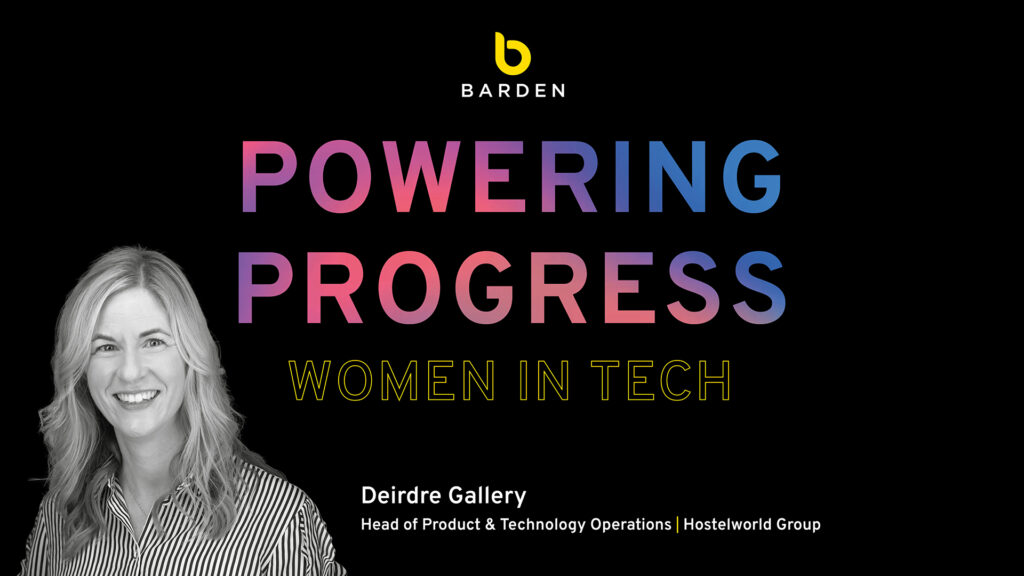Your career path is quite unique – starting in a Big 4 firm in accounting and finance, and eventually transitioning into technology. Could you tell us more about that shift?
My journey into technology was driven by a desire for variety and a need to do impactful work. I started my career in financial services audit with PwC, then moved to Australia, where I lived for 10 years and gained experience in finance, mergers and acquisitions, project management, and change management. When we decided to move back to Ireland, I knew that if I was going to settle after a decade in Australia, I needed a role that was interesting, dynamic, and filled with opportunities to innovate and work with great people. That led me to Hostelworld, initially on a nine-month contract – but I’m still here 8 years later! I joined the finance team, but my curiosity soon led me to explore different areas, such as analytics, customer data science, BI reporting, product, and technology. I’m now Head of Operations in Product and Tech, where I leverage my finance background to ensure projects are cost-effective and profitable. I also act as a bridge between technology, product, and finance teams, helping them focus on initiatives that deliver the highest value.
Did you ever feel out of your depth, especially with the technical aspects? For instance, not knowing how to code or build products?
Oh, absolutely! I remember when I was offered the interim Head of Site Reliability Engineering (SRE) role. I had no experience in this area and thought, “I can’t do that.” But I realised that if I focused on my strengths – communication, clarity, and alignment – I could still add value. You don’t need to know every technical detail if you can facilitate clear communication, be logical, and guide the team towards impactful outcomes. I concentrated on understanding the purpose and objectives of the team. By fostering open communication, getting the right people in the room, and aligning everyone’s focus, I could help the team make a bigger impact.

Have any mentors or colleagues particularly influenced your journey, especially as you moved through different roles at Hostelworld?
Yes, mentorship has been a big part of my career. Early on, my friend’s uncle, Joe Hanley, did a mock interview with me to prepare for my PwC interview, which made a huge difference. That experience left a lasting impact, and now I try to pay it forward by helping others where I can. Many people have great potential and just need a little support to get there.
I’ve also had the privilege of working with Johnny Quach, our former CPO. He taught me that leadership isn’t about being busy and working long hours, it is about being strategic and making things happen where it matters most. He also taught me not to overthink things in striving for perfection but being able to move things forward can be a game-changer. Decisive action over unnecessary hesitation. I currently have an external mentor, who is great for getting independent insights and working through tough decisions with someone outside my internal network.
What do you consider to be the specific challenges and opportunities for women in the technology field?
Women in technology face challenges such as the confidence gap, imposter syndrome, and balancing work and personal life. Many struggle with self-doubt despite being highly qualified. My tips would be to push yourself out of your comfort zone, constantly challenge yourself, and ask questions. If it doesn’t make sense to you, chances are it doesn’t make sense to others. Surround yourself with people who believe in you but who will also challenge you to grow.

The tech industry can be demanding. How do you manage work-life balance?
We all want to be the best mother, colleague, manager, or employee, but we also want to avoid burnout. I find that balancing work and personal life requires clear priorities and making the most of small time blocks.
When making decisions, I generally stick to these principles:
- Act on Data: Don’t procrastinate. If the data is there, make the decision. Waiting for “perfect” information can stall progress, so decide with what information is available and adjust as needed.
- Involve Key Stakeholders: Quickly bring the right people together to avoid unnecessary back-and-forth and ensure decisions propel projects forward.
- Establish Accountability: Ensure everyone understands their roles and expected outcomes to eliminate confusion and prevent delays.
Personal Focus:
- Vision Board: Every January, I create a vision board with friends to clarify priorities for the year. This helps focus on what matters in both personal and professional life.
- Prioritise Hobbies and Relationships: Identify your non-negotiables so you can make clearer decisions on how to spend your time.
- Have No Regrets: Set realistic expectations, give your best each day, and feel good about your efforts—even when things don’t go as planned.
How do we support and encourage more women to pursue careers in technology?
Increasing the visibility of women in STEM roles is crucial. Successful women in tech serve as role models, inspiring others and raising awareness of the opportunities available.

Technology firms should continue to engage with schools, showcasing job opportunities and providing hands-on experiences, helping students understand the possibilities and the paths to get there. It’s not solely about STEM subjects but also about showing young women that these careers are diverse and dynamic, not just sitting behind a computer coding all day. Mentorship also plays an important role and it’s crucial to give back and raise up the next level of women.
Is there any technology you’re particularly excited about, especially something with game-changing potential?
The power of AI is transformative, and it’s evolving so quickly. It’s changing how we work, with constant updates to tools and growing automation. This makes everything faster and more efficient, especially in the tech team where we see new tools regularly. It’s essential to stay agile and forward-thinking since technology changes so rapidly.
We are experimenting with a few AI tools now, and the efficiencies they bring are incredible. Even simple tools like meeting copilot, which summarises minutes and actions automatically, save so much time. Quarterly planning, for instance, is a different experience now, with hybrid work shifting our approaches. Remote work has influenced workflows, where sessions are recorded, minutes are available instantly, and everyone can work together on virtual boards. Interestingly, returning to in-person meetings highlighted these differences. While some tasks were faster face-to-face, others were more efficient remotely. Being mostly remote, we’re adapting to in-person meetups again, balancing the strengths of each setting! It’s fascinating to see how these changes unfold and impact our efficiency and collaboration styles.


 Jump Back
Jump Back

